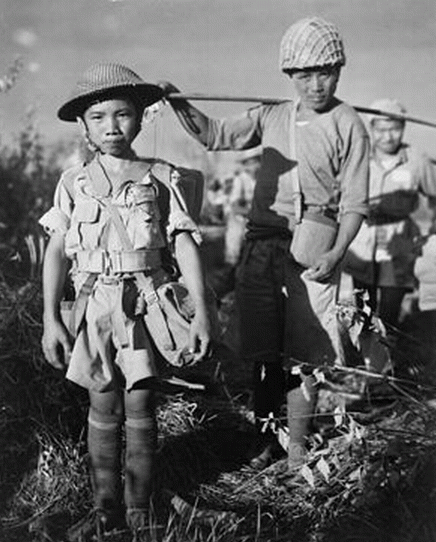June Terpstra and Husayn Al-Kurdi
"If they would rather die, said Scrooge, they had better do it, and decrease the surplus population."
The militarization of public schools is a subject concerning the life and death of the young people of this country and those millions across the globe they will be trained to kill, torture, and invade. To speak of this is to challenge the intense economic, social and cultural campaigns conducted to convince populations that wars benefiting the rich are wars guaranteeing freedom. The increasing need for young people to voluntarily join the US military to fight the wars for the enforcement of global capitalism as it expands its markets poses a challenge for radical educators to provide alternative scenarios. This article examines this agenda for militarization and provides strategies for counter-campaigns to end militarization in the public schools and the culture at large.
The educational system in the USA has from its inception been a site of struggle between the owning and possessing classes and those who serve them and abide by their bidding. Schools are the breeding grounds in which competing fantasies, fears, hopes and desires held by individuals and social groups crystallize. Public schooling is used to promote the militarization of young people whose class, racial and gender perspectives represent various competing ideological and economic claims. Unsuspecting young people are unaware that this militarized education will lead to train the individual to more readily kill and commit war crimes such as those committed by U.S. troops in Iraq, such as the brutality exhibited at Abu-Ghraib or in Mahmoudiya, where soldiers gang-raped a teen-age Iraqi girl and burned her body to destroy the evidence.
As Kenneth Saltman explains in Education as Enforcement:
Military generals running schools, students in uniforms, metal detectors, police presence, high-tech ID card dog tags, real time Internet-based surveillance cameras, mobile hidden surveillance cameras, security consultants, chainlink fences, surprise searches"--are all part of the investment the military industrial complex is embedding in U.S. public schools as they increasingly resemble the military and prisons. Militarism and the promotion of violence as virtue pervade foreign and domestic policy, popular culture, educational discourse, and language. In addition to promoting recruitment, military education plays a central role in fostering a social focus on discipline. In short, to speak of militarized schooling in the United States context it is inadequate to identify the ways that schools increasingly resemble the military and prisons. This phenomenon needs to be understood as part of the militarization of civil society exemplified by the rise of militarized policing, increased police powers for search and seizure, anti-public gathering laws, "zero tolerance" policies, and the transformation of welfare into punishing workfare programs.
The process of molding recruits into serviceable troops is based on indoctrinating them in the dehumanization of designated enemies. In the present US-led wars of terror these "enemies" are people who pose no threat to the individual or country but whose resources are coveted by the corporations. Additionally, the killing fields of the present US wars target people who mean nothing to capitalism's obedient generals but a playground in which to use up old weapons and military equipment and experiment with new weapons and technologies. The public school military agenda offers the first steps to train young people to overcome any fear or prejudice against killing that the culture has not already dispelled via video games and films where the military is portrayed in ads as an adventure and a way to gain skills and a future education (providing one does not get killed). The heroism of service is consistently morphed with the concept of freedom along with an understated promotion of the excitement of killing bad guys. Ads, films and TV shows suggest that to be in the military is to be in respected and powerful elite. The main themes stress tangible rewards such as educational opportunities, high-tech skills training, and managerial expertise, which can later translate into cash in the corporate sector.
Chicago is one of the most militarized zones in need of de-militarization. There are five military academies affiliated with the Army, Navy, or Marines in the Windy City. Along with required attendance in the Junior ROTC program cadets must wear full military costumes to school and undergo daily uniform inspections, take a daily ROTC course focusing on military history, map reading and navigation, drug prevention, and the branches of the Department of Defense. Cadets can be seen marching on an academy's drill team, learning the proper way to fire a weapon and shoot to kill. Military commandants from the U.S. armed services teach alongside math and music teachers in each academy. Three of these military academies were created in part with Department of Defense appropriations, funds secured by Illinois lawmakers. CPS is the only public school system in the country with Air Force, Army, Navy, and Marine Corps high school academies. In 2000, the armed services Chiefs of Staff testified before The House Armed Services Committee that 30%-50% of all Junior ROTC cadets later enlist in the military. Organizations opposing the military's growing presence in public schools insist that it's no coincidence that the number of military academies in Chicago is on the rise at a time when the U.S. military has had difficulty meeting its recruitment targets while fighting unpopular wars of aggression.
A militarized society from which to draw human cannon fodder is crucial to imperialist global control. The military is one of the most important sites of struggle for educators and researchers. Militarized schooling should be resisted at the local level as in organizations such as the Military Out of our Schools campaign that seeks to eject JROTC programs from public schools. Beyond this, an aggressive campaign that counters the cultural, social and economic program of the military is needed. We must provide an educational curriculum which facilitates the development of critical awareness of the student's social, political and cultural conditions and conditionings.
Wikipedia image of child soldiers in China






